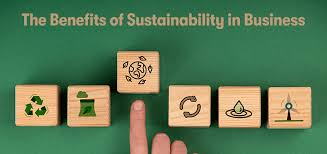Introduction to Sustainable Business Practices
Sustainable business practices refer to the methods and strategies that organizations implement to minimize their environmental impact while maintaining profitability. At its core, sustainability in business encompasses an approach that considers not only economic growth but also the ecological and social responsibilities of a company. As the global population continues to increase and natural resources dwindle, the urgency for businesses to adopt sustainable practices becomes more pronounced. This shift is not merely a trend but a necessity for both contemporary enterprises and our planet’s future.
Understanding sustainable business practices means recognizing their holistic nature. Companies that adopt such practices aim to operate in a way that preserves resources for future generations while still achieving their financial objectives. This balance can be achieved through various means, such as optimizing energy efficiency, reducing waste, sourcing materials responsibly, and engaging in equitable labor practices. Firms that prioritize sustainability not only contribute to environmental conservation but also enhance their own economic viability by cultivating customer loyalty and staying ahead of regulatory requirements.
The importance of sustainability is increasingly recognized by consumers who are more informed and concerned about the environmental ramifications of their purchases. As a result, businesses that embed sustainable practices into their operations often experience a competitive advantage. The integration of eco-friendly methods, such as renewable energy use or sustainable supply chain initiatives, not only helps to mitigate environmental degradation but also strengthens the economic foundation of the business in the long term. In this regard, sustainable business practices serve as a valuable model for future-driven corporate responsibility and innovation.
Understanding Economic Sustainability
Economic sustainability refers to the ability of a business to operate efficiently while maintaining its financial viability over the long term. It involves balancing the need for economic growth with environmental stewardship, ensuring that financial gains do not come at the expense of natural resources. In recent years, businesses that adopt sustainable practices have discovered that not only do these methods contribute to environmental health, but they can also lead to considerable economic benefits.
One key advantage of economic sustainability is cost reduction. Sustainable businesses often implement practices that minimize waste and enhance resource efficiency. For example, adopting energy-efficient technologies or reducing water consumption can significantly lower operational costs. By effectively managing resources, businesses can maintain or even improve their profit margins. This efficient use of resources also reduces reliance on depleting ecosystems, ensuring the business can sustain its operations over time.
Furthermore, sustainable practices can significantly improve a company’s reputation, which in turn can attract new customers and open up new markets. Consumers are increasingly prioritizing sustainability when making purchasing decisions. Therefore, companies that demonstrate a commitment to sustainable operations are likely to gain a competitive edge in their respective industries. This shift in consumer behavior emphasizes the importance of aligning business models with sustainable principles, ultimately leading to increased sales and improved financial performance.
Incorporating sustainability into a company’s strategy not only enhances its market position but also fosters innovation. Companies motivated to pursue sustainable solutions often discover new business opportunities and revenue streams, further contributing to their economic sustainability. By investing in research and development for eco-friendly products or services, businesses can expand their market reach and respond proactively to evolving consumer preferences.
In conclusion, economic sustainability embodies a holistic approach towards financial stability that prioritizes responsible resource management. By embracing sustainable practices, businesses can enhance their operational efficiency, reduce costs, and unlock new market opportunities, solidifying their financial performance over the long term.
Environmental Sustainability and Its Importance
Environmental sustainability refers to the responsible interaction with the planet to maintain natural resources and ecosystems while ensuring future generations can thrive. For businesses, adopting environmentally sustainable practices is no longer optional; it forms a critical component of overarching corporate strategies. By minimizing their ecological footprint, companies can enhance their operational efficiency and bolster their reputation, ultimately contributing to long-term success.
One of the key elements of environmental sustainability is waste reduction. Businesses that implement strategies to minimize waste production not only lower disposal costs but also track material usage more efficiently, which can lead to significant cost savings. For example, by adopting a circular economy approach, companies can repurpose materials rather than discarding them, thereby reducing their environmental impact. This not only helps preserve resources but also provides a valuable opportunity for innovation and efficiency.
Conserving resources such as water and energy is another crucial aspect of environmental sustainability. Businesses can employ various measures such as energy-efficient equipment, sustainable sourcing of materials, and comprehensive recycling programs to reduce consumption. Investing in renewable energy sources like solar or wind power not only contributes to energy autonomy but also demonstrates a commitment to environmental stewardship. By integrating these practices, businesses can ensure operations are aligned with sustainable economic growth while mitigating risks associated with resource scarcity.
Moreover, the link between environmental health and business longevity should not be underestimated. Consumers today increasingly prefer companies that display a commitment to sustainability, often choosing to engage brands that align with their ethical values. Therefore, businesses that prioritize eco-friendly practices are likely to gain a competitive edge, ensuring their relevance in a marketplace that prioritizes sustainability. Investing in environmental sustainability not only fosters a healthier planet but also enhances corporate longevity and profitability.
Consumers’ Shift Towards Sustainability
In recent years, there has been a significant shift in consumer preferences towards sustainability. As global awareness of environmental issues continues to rise, consumers are actively seeking brands that prioritize eco-friendly practices and sustainable products. This change is not merely a trend but reflects a fundamental transformation in market dynamics, with sustainability influencing purchasing decisions in remarkable ways.
Market data indicates that consumers, particularly millennials and Generation Z, are increasingly willing to spend more on products that have clear sustainability credentials. Research reveals that 73% of millennials are prepared to pay extra for sustainable brands, highlighting a lucrative market opportunity for businesses that align with these values. Businesses that do not adapt risk losing out on this growing, conscientious customer base.
Successful brands illustrate that integrating sustainability into business models can lead to long-term success. For instance, brands like Patagonia and The Body Shop have thrived by embodying principles of environmental stewardship and social responsibility. Patagonia’s commitment to using recycled materials and its “Don’t Buy This Jacket” campaign have not only raised awareness about overconsumption but have also solidified the brand’s loyal customer base. Similarly, The Body Shop has carved a niche within the market by emphasizing cruelty-free products and fair trade practices, which resonates strongly with ethically-minded consumers.
Moreover, organizations embracing sustainable practices often see enhanced employee engagement and loyalty as well. A workforce that is aligned with a company’s values is likely to be more productive and committed. Overall, aligning with consumer demand for sustainability is not just beneficial from a marketing standpoint; it is a strategic imperative for companies aspiring to ensure economic viability while contributing positively to the environment.
Positive Impact on Brand Reputation
In today’s competitive marketplace, the reputation of a business is paramount. Companies that adopt sustainable practices not only contribute positively to the environment but also enhance their brand reputation significantly. When a business is perceived as ethical and responsible, it fosters trust among consumers, leading to increased customer loyalty. Consumers today are increasingly aware of and concerned about the environmental and social implications of their purchasing decisions. They gravitate toward companies that demonstrate a commitment to sustainability, reflecting a broader shift towards responsible consumption.
Furthermore, implementing sustainable practices can aid in better employee retention. A company that prioritizes environmental initiatives is often viewed as a more desirable employer. Employees are generally more engaged and satisfied working for organizations that align with their values, particularly when those values include social and environmental consciousness. This alignment not only boosts morale but also enhances productivity, contributing to a positive brand image. Companies like Patagonia have successfully created a strong reputation by promoting their commitment to environmental sustainability and ethical production, resulting in a loyal customer base and low employee turnover.
Moreover, an enhanced reputation can improve public relations and overall business performance. Sustainable companies often enjoy favorable media coverage and are more likely to receive awards and recognition within their industries. Such accolades serve to further bolster brand reputation and attract new customers. For instance, Unilever has effectively built its brand around sustainability, showcasing its responsible sourcing and product initiatives, which has resonated with consumers globally. By promoting transparency and accountability, these companies can create strong emotional connections with their audience, ultimately resulting in enhanced loyalty and trust.
Long-Term Cost Savings and Efficiency Gains
Sustainable business practices are increasingly recognized for their potential to deliver long-term cost savings and enhance operational efficiency. By integrating sustainability into core business operations, organizations can identify and implement strategies that reduce expenses while simultaneously fostering a healthier environment. One of the key areas where businesses can realize significant savings is through energy efficiency. By embracing energy-efficient technologies and practices, companies can lower their utility bills and reduce their carbon footprint. This includes upgrading to LED lighting, improving insulation, and investing in energy-efficient machinery and equipment. Over time, these changes lead to substantial reductions in energy consumption, translating directly into cost savings.
Additionally, waste reduction initiatives present another avenue for financial savings. By adopting practices such as recycling, composting, and waste minimization, businesses can decrease disposal costs and divert materials from landfills. Not only does this contribute to a cleaner environment, but it also can result in lower operational costs. Organizations that focus on reducing waste often find it necessary to scrutinize their supply chains closely. This leads to more responsible sourcing of materials, which can further optimize operational efficiency and minimize expenses associated with raw material procurement.
Furthermore, companies that commit to sustainable procurement practices often benefit from establishing stronger relationships with suppliers. By prioritizing suppliers who adhere to sustainable practices, businesses can mitigate risks related to supply chain disruption and potential reputational damage. As customer demand shifts toward more environmentally conscious products, companies that proactively engage in sustainability will likely see increased customer loyalty and market share. Overall, the pursuit of sustainable practices not only positions a company favorably in the eyes of consumers but also fosters a culture of innovation and improvement that drives long-term economic benefits.
Regulatory Compliance and Risk Management
In the contemporary business landscape, the importance of regulatory compliance and risk management cannot be overstated, especially as environmental regulations continue to tighten globally. As governments increasingly prioritize sustainability, organizations are compelled to align their operations with relevant laws aimed at protecting the environment. Sustainable business practices, therefore, become a proactive approach not just for ethical consideration, but also for legal compliance.
Companies that invest in sustainable initiatives often find themselves better positioned to navigate the complexities of regulatory requirements. For instance, adopting sustainable sourcing practices can mitigate risks related to resource depletion and potential regulatory penalties. By implementing comprehensive compliance strategies that prioritize sustainability, organizations can identify potential legal risks early on and develop measures to address them proactively. This not only safeguards the business against fines and sanctions but also fosters a corporate culture rooted in responsibility and ethical conduct.
Moreover, staying ahead of regulations lends a competitive advantage. Companies that lead in sustainable practices often attract conscientious consumers and investors who are increasingly demanding transparency and accountability. This shift in consumer behavior underscores the necessity for firms to not just meet existing regulatory standards but to exceed them, thereby mitigating risks associated with future compliance changes. By embedding sustainability into their core strategy, businesses can further enhance their reputation, leading to increased brand loyalty.
In conclusion, integrating sustainability into business operations is not merely a response to regulatory mandates; rather, it is a strategic approach to risk management. Firms that actively engage in sustainable practices and maintain compliance with environmental laws will find themselves in a robust position for long-term resilience and success. This proactive and preventive focus is essential in navigating today’s complex regulatory landscape while also contributing positively to the environment.
Innovation and Competitiveness Through Sustainability
Sustainability has emerged as a crucial factor in contemporary business strategies, influencing operational models and reshaping competitive landscapes. Companies that adopt sustainable practices often discover that these initiatives serve as a catalyst for innovation. By integrating sustainability into their core operations, businesses are prompted to rethink their approach to products and services, leading to the development of innovative solutions that meet changing consumer demands and regulatory requirements. This proactive mindset fosters a culture of innovation, positioning organizations as leaders in their industries.
One of the key benefits of early adoption of sustainable technologies is the competitive advantage it provides. Firms that invest in sustainable technologies not only optimize their resource usage but also often experience reduced operational costs. For example, energy-efficient processes can lead to considerable savings and increased profitability. Moreover, consumers are increasingly favoring brands that demonstrate environmental responsibility, making sustainability a vital component of brand loyalty and market differentiation.
Furthermore, sustainable practices can aid in attracting and retaining talent. Employees are increasingly seeking out employers who prioritize environmental and social responsibility. This shift in workforce preferences fosters a dynamic and motivated team, further enhancing the company’s innovative capabilities. In essence, by prioritizing sustainability, companies create an ecosystem where innovation thrives; this results in new market opportunities and strengthens their competitive position in an evolving marketplace.
Importantly, embracing sustainability often paves the way for collaboration across sectors. Businesses can benefit from partnerships that emphasize sustainable development, sharing knowledge and practices that lead to enhanced technological advancements. These collaborations tend to spur breakthroughs that may not have been possible through isolated efforts, illustrating the critical role of sustainability in driving industry-wide innovation and competitiveness.
Conclusion: Embracing Sustainability for a Better Future
As we have explored throughout this article, the long-term benefits of sustainable business practices extend far beyond immediate financial outcomes. Organizations that adopt sustainability-focused strategies not only contribute to environmental conservation but also position themselves competitively within their respective industries. The importance of integrating economic and environmental considerations cannot be overstated, as these practices ultimately foster a resilient business model that supports both the planet and society.
One of the foremost advantages of sustainable business practices is the potential for cost savings through energy efficiency and waste reduction. Companies that prioritize sustainable operations often find innovative ways to streamline processes, leading to lower operational costs over time. Furthermore, embracing environmentally friendly practices can enhance brand loyalty and attract a growing demographic of conscious consumers who prioritize sustainability in their purchasing decisions. This shift in consumer behavior signifies a critical opportunity for businesses willing to adapt and embrace sustainable solutions.
Moreover, a commitment to sustainability can enhance a company’s reputation, making it more attractive to investors and partners. As public awareness around environmental issues increases, stakeholders are more likely to align with organizations that demonstrate a genuine commitment to sustainability. By actively engaging in sustainability initiatives, businesses can showcase their dedication to social responsibility, which reinforces their credibility in the market.
In light of these insights, it becomes apparent that sustainable business practices are not merely an option but a necessity for enterprises aiming for enduring success. As business leaders, the onus lies on us to foster an organizational culture that embraces sustainability. By doing so, we not only contribute to the well-being of our planet but also secure a thriving future for our businesses and the communities we serve. The path towards sustainability is a shared responsibility, and it is essential to embrace it for the betterment of all.
How useful was this post?
Click on a star to rate it!
Average rating 0 / 5. Vote count: 0
No votes so far! Be the first to rate this post.









